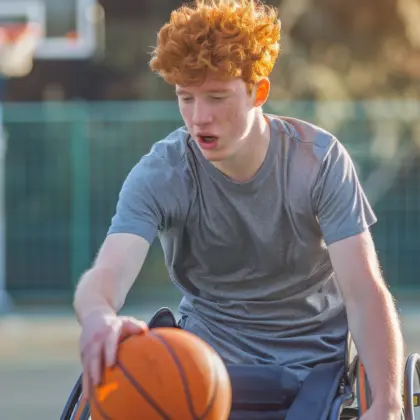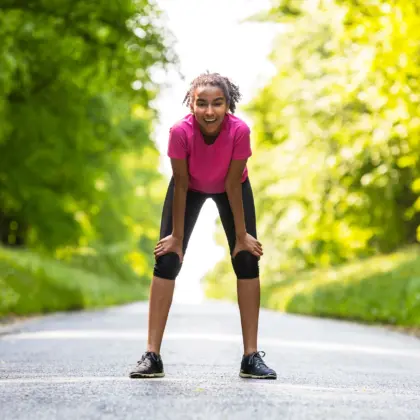I can move in ways that make me feel strong, confident, and happy.
I can take steps to keep healthy
Children’s Charter Promise


Ages 16–18: Stay Active, Stay Balanced
More about Ages 16–18: Stay Active, Stay BalancedWhy Being Active Matters
Being active isn’t just about fitness it’s about feeling good in your body and mind. Whether you’re walking / wheeling, dancing, playing sports, or just moving in your own way, regular physical activity can help you:
- Focus better in lessons and exams
- Build strong muscles and bones as you grow
- Maintain a healthy weight
- Sleep better
- Feel happier and less stressed
How Much Should I Be Doing?
Aim for at least 60 minutes of physical activity every day. This can include:
- Moderate or intense aerobic activity (like walking, wheeling, running, cycling)
- Muscle-strengthening (like climbing, dancing, or resistance exercises)
- Bone-strengthening (like jumping, skipping, or sports)
You don’t have to do it all at once split it up throughout the day. Even short bursts of movement add up!
How to Fit It In
- Make it part of your day walking / wheeling or cycle to school, join in during PE or after-school clubs, take movement breaks during revision
- Choose what you enjoy – football, dance, martial arts, or skateboarding
- Set yourself a challenge – run a 5K, improve your strength, or follow a plan
- Try something new – join a gym, try a class, or follow free workouts on YouTube
What Counts as Moderate Activity?
If your heart rate goes up and you start to feel warm, you’re probably doing moderate activity. A good test? You can talk, but you can’t sing the words to a song.
Examples include:
- Walking / wheeling to school
- Riding a bike scooter
- Swimming
- Skateboarding or rollerblading
- Walking / wheeling with the dog
- Cycling on flat ground
- Playing in the playground or park

Benefits of Being Active:
😊 Mood Boost - Releases endorphins, reduces anxiety
🧠 Focus & Memory - Improves concentration and brain function
💤 Better Sleep - Helps regulate sleep patterns
💪 Confidence - Builds self-esteem through achievement
🤝 Social Skills - Encourages teamwork and communication
🧘 Stress Relief - Helps manage emotions and calm the mind
More Resources to Explore:
- Sport Wales – Physical Literacy
- Disability Sport Wales
- Get Out Get Active - Pride Cymru
- Youth Sport Trust
- Mind – Physical Activity & Mental Health
- Make Your Move – Activity Videos
- GOV.WALES – Sport & Active Recreation
- Recipe Book - Betsi Cadwaladr University Health Board
Local & National Resources to Help You Get Active
North Wales-Based Resources
- What it is: A regional partnership aiming to get more people in North Wales active.
- Why it’s useful: You can find local clubs, activities, and support for getting involved in sport or movement—whether you’re a beginner or looking to try something new.
- Great for: Finding inclusive, community-based activities near you.
Wales-Wide Programmes
Welsh Athletics – Children & Young People
- What it is: A hub for athletics-based programmes like Starting Blocs, Junior Parkrun, QuadKids, and Sportshall.
- Why it’s useful: Offers structured, fun, and inclusive ways to get involved in running, jumping, and throwing.
- Great for: Young people who enjoy track and field or want to try something new.
Junior Parkrun
- What it is: Free, weekly 2k runs for children aged 4–14.
- Why it’s useful: A fun, non-competitive way to get moving with others in your community.
- Great for: Building fitness, confidence, and friendships.
The Daily Mile
- What it is: A school-based initiative where pupils run, jog, or walk for 15 minutes a day.
- Why it’s useful: Helps build a daily habit of movement and supports mental wellbeing.
- Great for: Schools and youth groups looking to promote everyday activity.
Explore Coastal Walks and Cycle Routes
- Wales Coast Path – https://www.walescoastpath.gov.uk/?lang=en
- Walk the Wales Coast Path – https://walescoastpath.co.uk/
- Interactive Route Map – https://www.walkthewalescoastpath.co.uk/wcp-sections/the-wales-coast-path-interactive-map/
- Sustrans Cymru (Cycle Routes) – https://www.sustrans.org.uk/our-blog/national-cycle-network/routes-in-wales/
- Cycling UK – Wales – https://www.cyclinguk.org/wales
Useful Tools & Wellbeing Resources
- AdventureSmart UK – https://www.adventuresmart.uk
- Refill Wales App – https://www.refill.org.uk/refill-wales/
- Traveline Cymru – https://www.traveline.cymru